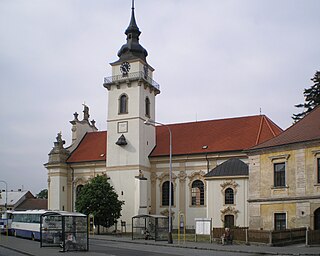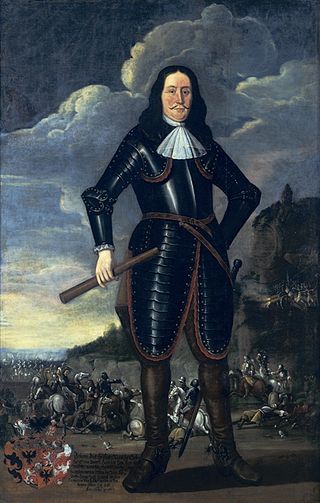
Matthias Bernard Braun was a sculptor and carver active in the Kingdom of Bohemia, one of the most prominent late baroque style sculptors in the area.
Czech nobility consists of the noble families from historical Czech lands, especially in their narrow sense, i.e. nobility of Bohemia proper, Moravia and Austrian Silesia – whether these families originated from those countries or moved into them through the centuries. These are connected with the history of Great Moravia, Duchy of Bohemia, later Kingdom of Bohemia, Margraviate of Moravia, the Duchies of Silesia and the Crown of Bohemia, the constitutional predecessor state of the modern-day Czech Republic.

The Estates Theatre is a historic theatre in Prague, Czech Republic. The Estates Theatre was annexed to the National Theatre in 1948 and currently draws on three artistic ensembles, opera, ballet, and drama, which perform at the Estates Theatre, the National Theatre, and the Kolowrat Theatre.

Lysá nad Labem is a town in Nymburk District in the Central Bohemian Region of the Czech Republic. It has about 10,000 inhabitants. It is situated on the Elbe River. The town centre is well preserved and is protected by law as an urban monument zone.

Heřmanův Městec is a town in Chrudim District in the Pardubice Region of the Czech Republic. It has about 5,000 inhabitants. The historic town centre with the castle complex is well preserved and is protected by law as an urban monument zone.

The House of Thun und Hohenstein, also known as Thun-Hohenstein, belonged to the historical Austrian and Bohemian nobility. There is one princely and several comital branches of the family. The princely branch of the family lived at Děčín in Bohemia for more than 200 years. The family maintained an expansive library, including two important albums depicting artistically and technologically innovative armour made for the Habsburg court during the fifteenth and sixteenth centuries.
Antonio Bioni (1698–1739) was an Italian composer, best known for his operas, and who, from 1726 onwards, spent a large part of his career working in Wrocław in the Holy Roman Empire.

Count Jindřich Matyáš of Thurn-Valsassina, was one of the leaders of the Protestant Bohemian Revolt against Emperor Ferdinand II. He took part in events that led to the Thirty Years' War, and after the war he became a military leader and diplomat in Swedish service, who eventually resided in Swedish Estonia.

Prince Franz Anton von Thun und Hohenstein was an Austro-Hungarian nobleman and a statesman.
Václav Antonín Chotek of Chotkov and Vojnín was a Bohemian nobleman and royal Stadtholder in the Kingdom of Bohemia.

The theatre of the Czech Republic has a rich tradition in all genres, including drama, opera, ballet and dance, puppet theatre, black light theatre etc.

Suchdol is a market town in Kutná Hora District in the Central Bohemian Region of the Czech Republic. It has about 1,100 inhabitants.
Antonio Denzio was an Italian impresario, tenor, and librettist. Born in Venice to a family of musicians and operatic personnel, he pursued a career mainly as a singer until 1724, when he traveled to Bohemia as a member of the opera company of Antonio Maria Peruzzi, probably his uncle. Peruzzi had the idea of bringing an Italian opera company to Central Europe to perform first in Prague, then Dresden and Leipzig. The company was first brought to Bohemia under the patronage of Count Franz Anton von Sporck, who had it play at his palace at Kuks in northwest Bohemia in the summer of 1724. The performances were so successful that he permitted the company to perform free of charge in his palace in Prague. After disagreements with Peruzzi, Denzio was able to supplant him as impresario before the end of the year 1724 and continued productions in the Sporck palace until 1735. Peruzzi left with some of the Peruzzi-Denzio players to found the Breslau Opera. Denzio's opera theater at Sporck's palace was the first standing opera theater in the city. His productions were popular with the Bohemian nobility until about 1729, after which Denzio's finances deteriorated. Count Sporck provided no financial assistance to the company except the free use of his theater, and he allowed it to fail. The company went bankrupt and Denzio was forced to spend time in debtors' prison. During its heyday, Denzio was able to attract at least one of the principal singing stars in Italy to Prague each season. The most prominent of all was Margherita Gualandi, who was forced to come to Prague after being blackballed in Italy for bad behavior. Denzio sought the assistance of Antonio Vivaldi in engaging singers for his company, and the composer sent music. In the early 1730s, Vivaldi came himself to Prague. Some of the music for one of his operas composed for Prague, Argippo, has only recently been re-discovered.
La pravità castigata is a 1730 pastiche with music by multiple composers and an Italian language libretto by Antonio Denzio. It is the first 18th-century opera based on the Don Juan legend. It was also the first opera ever produced that retains the original setting and at least some of the original character names derived from early 17th-century dramatic prototypes of the Don Juan legend, the most important of which is Tirso de Molina's play El burlador de Sevilla y convidado de piedra. La pravità castigata was originally performed during Lent of 1730 in the opera theater of Franz Anton von Sporck in Prague, then revived with new music by Eustachio Bambini in Brno in 1734. The Brno performance was regarded as the original production for decades, and a published transcription of the libretto identifies it incorrectly as an anonymous text first performed in Brno.

The Divadlo v Kotcích, German Theater an der Kotzen, in English more usually Kotzen Theatre, was a Prague theatre and opera venue on v Kotcích street, which had its heyday from 1739 to 1783 as the second public opera theatre in Prague. Spoken plays and ballets were also presented there.

Mathias Franz Graf von Chorinsky Freiherr von Ledske was first Bishop of the Roman Catholic Diocese of Brno, Imperial and Royal senior Privy Counsellor of the Imperial and Royal Privy Council of the Habsburg monarchy and with his equally eminent brothers the first Counts of Chorinsky.

Marie Červinková-Riegrová was a Czech writer.
Daniel Evan Freeman is an American musicologist who specializes in European art music of the eighteenth century, in particular the musical culture of eighteenth-century Prague and the Bohemian lands. He is also active as a pianist and music editor.

Apart from the 1733 Mass for the Dresden court, Johann Sebastian Bach wrote four further Kyrie–Gloria Masses, BWV 233–236. These compositions, consisting of the first two sections of the Mass ordinary, have been indicated as Missae breves or Lutheran Masses.

Johann von Sporck was a German nobleman and Generalfeldmarschall. Sporck was born in 1595 and he began his military career at the start of the Thirty Years' War as a private. His personal bravery and mastery of cavalry tactics led to his steady advancement through the ranks as well as his ennoblement. He later fought in the Second Northern War, the Austro-Turkish War (1663–64) and the Franco-Dutch War. He retired in 1676, having received the rank of Generalfeldmarschall and accumulating great riches. He died three years later. His son Franz Anton von Sporck became a publisher and a patron of arts.
















